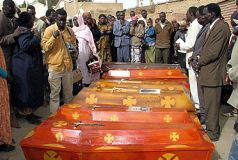Sudan refugees bury dead in Egypt killing
Mar 13, 2006 (CAIRO) — Sudanese refugees laid the bodies of loved ones killed in a police assault on their camp to rest in Cairo after Egypt refused to grant them permission to take the corpses home for burial.
 The seven dead were part of a group of 30 Sudanese refugees and asylum-seekers who died when thousands of riot police wielding batons and water canon broke up a three-month sit-in in central Cairo on December 30.
The seven dead were part of a group of 30 Sudanese refugees and asylum-seekers who died when thousands of riot police wielding batons and water canon broke up a three-month sit-in in central Cairo on December 30.
Women wailed and men held their heads as the caskets were lowered into a prearranged burial place at an Anglican cemetery in the northeastern Cairo suburb of Abassiya.
It was the second batch of corpses released to families, with the first group of 18 bodies handed over for burial on Wednesday, more than two months after they died.
Protesters had called last year’s sit-in outside offices of the UN refugee agency to draw attention to their cause, including demands the office reopen cases of applicants it had rejected and resettle refugees in third countries.
“The Lord gives and the Lord takes,” read an inscription on the coffins.
Inside lay the decomposing bodies, some barely recognisable by friends after separate autopsies carried out by Egyptian and Sudanese doctors to dispel allegations that some had their organs removed.
One was that of a 13-year-old child.
Most of the bereaved turned up early at the city’s main morgue and waited nearly five hours to complete paperwork and perform the grim task of making a final identification of the bodies of their loved ones.
“Why, God?” asked one woman, holding her hands in the air before grief overcame her and she fell to the ground. Others immediately helped the woman up and comforted her.
Many wanted to transport the bodies of their relatives to Sudan, but Egyptian officials refused, fearing a violent backlash against Egyptian interests in Sudan.
“Do not pass judgment against others,” said the pastor who presided over a brief prayer at the cemetery, trying to calm scores of mourners who blame Egyptian security forces for the deaths of their relatives.
The incident strained relations between the Egypt and the government of south Sudan, the region the majority of the victims hailed from, and resulted in the expulsion of Egyptian diplomats from the south.
“People are still hurt, it will take time for the wounds to heal and even then, the scars will remain,” the Reverend Joseph Lupai Charles, secretary general of the council of Sudanese churches in Egypt, told AFP.
Egypt detained over 2,000 protesters during the operation to clear the Mustafa Mahmud Square where they had been camping and threatened to deport them, but Egypt freed everyone after the UN refugee agency intervened.
Some people lost all their meager belongings in the raid and families decided not to extend the mourning period for as long as the bodies are at the morgue.
“That could happen only after the burial, according to our tradition,” said Morris Atutu, whose wife Betty Asienzo’s body was among those buried on Monday.
Four of the bodies remain in the morgue, with relatives still refusing to bury them in Egypt.
Sudanese Church leaders in Egypt plan to hold a mass memorial for the victims once all the bodies have been buried, drawing a curtain on an incident many are anxious to forget.
“But first, all the pain must come out,” Lupai said.
(ST/AFP)
